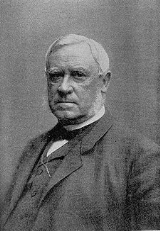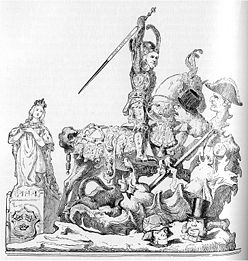
Louis Gerhard De Geer
Encyclopedia
Baron Louis Gerhard De Geer
of Finspång
(18 July 1818 24 September 1896) was a Swedish
statesman and writer.
De Geer was born at Finspång
manor. He was a lawyer, and in 1855 became president of the Göta Hovrätt, or lord justice for the appellate court of Götaland
. From 7 April 1858 to 3 June 1870 he was Prime Minister of Justice. As a member of the nobility he took part in the Swedish Riksdag of the Estates
from 1851 onwards. From 1867 to 1878 he was the member for Stockholm
in the first chamber in the New Riksdag
, and introduced and passed many useful reforms.
His son Louis De Geer
was also prime minister of Sweden for a short period.
in December 1865, and received the royal sanction on 22 June 1866. For some time after this De Geer enjoyed considerable popularity. He retired from the ministry in 1870, but took office again, as minister in 1875.
and served until April 1880, when the failure of his repeated efforts to settle the armaments question again induced him to resign. From 1881 to 1888 he was Chancellor for the Universities of Uppsala and Lund. He was an advocate of free trade and economic liberalism and some argue laid the foundations for the strong economic growth in Sweden from 1870 to 1970.
(Stockholm, 1874); Minnesteckning öfver B. B. von Platen (Stockholm, 1886); and his own Minnen (Stockholm, 1892), an autobiography, invaluable as a historical document, in which the political experience and the matured judgments of a lifetime are recorded with singular clearness, sobriety and charm. For example, his explanation of why he, at such a young age, was appointed prime minister, was that in the narrow circles of Swedish nobility at the time, it was difficult to find anyone with at least the mediocre intelligence which was needed for the office.
from 1862, on Seat 17. In 1862, he was also elected a member of the Royal Swedish Academy of Sciences
.

De Geer
De Geer is a family of Walloon origin which became notable in Sweden and the Netherlands...
of Finspång
Finspång
Finspång is a locality and the seat of Finspång Municipality, Östergötland County, Sweden with 12,415 inhabitants in 2005.-Overview:Finspång is a traditional industrial town. The first industries were established in 1580 when a Royal factory for cannon and cannon balls was chartered. The industry...
(18 July 1818 24 September 1896) was a Swedish
Sweden
Sweden , officially the Kingdom of Sweden , is a Nordic country on the Scandinavian Peninsula in Northern Europe. Sweden borders with Norway and Finland and is connected to Denmark by a bridge-tunnel across the Öresund....
statesman and writer.
De Geer was born at Finspång
Finspång
Finspång is a locality and the seat of Finspång Municipality, Östergötland County, Sweden with 12,415 inhabitants in 2005.-Overview:Finspång is a traditional industrial town. The first industries were established in 1580 when a Royal factory for cannon and cannon balls was chartered. The industry...
manor. He was a lawyer, and in 1855 became president of the Göta Hovrätt, or lord justice for the appellate court of Götaland
Götaland
Götaland , Gothia, Gothland, Gothenland, Gautland or Geatland is one of three lands of Sweden and comprises provinces...
. From 7 April 1858 to 3 June 1870 he was Prime Minister of Justice. As a member of the nobility he took part in the Swedish Riksdag of the Estates
Riksdag of the Estates
The Riksdag of the Estates , was the name used for the Estates of the Swedish realm when they were assembled. Until its dissolution in 1866, the institution was the highest authority in Sweden next to the King...
from 1851 onwards. From 1867 to 1878 he was the member for Stockholm
Stockholm
Stockholm is the capital and the largest city of Sweden and constitutes the most populated urban area in Scandinavia. Stockholm is the most populous city in Sweden, with a population of 851,155 in the municipality , 1.37 million in the urban area , and around 2.1 million in the metropolitan area...
in the first chamber in the New Riksdag
Parliament of Sweden
The Riksdag is the national legislative assembly of Sweden. The riksdag is a unicameral assembly with 349 members , who are elected on a proportional basis to serve fixed terms of four years...
, and introduced and passed many useful reforms.
His son Louis De Geer
Gerhard Louis De Geer
Baron Gerhard Louis De Geer of Finspång was a Swedish politician, who served in the first chamber of the Riksdag 1901-14, was governor of Kristianstad County 1905-23, and Prime Minister of Sweden for 121 days in 1920-1921.-Biography:Louis De Geer was son of the baron and former prime minister...
was also prime minister of Sweden for a short period.
Architect of the New Riksdag
His greatest achievement was the reform of the Swedish representative system. The reforms introduced a bi-cameral elected parliament replacing the existing cumbersome and less democratic representation by estates, a hangover from the later Medievel Times. This measure was accepted by the RiksdagParliament of Sweden
The Riksdag is the national legislative assembly of Sweden. The riksdag is a unicameral assembly with 349 members , who are elected on a proportional basis to serve fixed terms of four years...
in December 1865, and received the royal sanction on 22 June 1866. For some time after this De Geer enjoyed considerable popularity. He retired from the ministry in 1870, but took office again, as minister in 1875.
First Prime Minister
In 1876 he became the first Prime Minister of SwedenPrime Minister of Sweden
The Prime Minister is the head of government in the Kingdom of Sweden. Before the creation of the office of a Prime Minister in 1876, Sweden did not have a head of government separate from its head of state, namely the King, in whom the executive authority was vested...
and served until April 1880, when the failure of his repeated efforts to settle the armaments question again induced him to resign. From 1881 to 1888 he was Chancellor for the Universities of Uppsala and Lund. He was an advocate of free trade and economic liberalism and some argue laid the foundations for the strong economic growth in Sweden from 1870 to 1970.
Literary works
Besides several novels and aesthetic essays, De Geer has written a few political memoirs of supreme merit both as to style and matter, the most notable of which are: Minnesteckning öfver A. J. v. Höpken (Stockholm, 1881); Minnesteckning öfver Hans JärtaHans Järta
Hans Järta was a Swedish administrator and revolutionary. He helped overthrow Gustavus IV Adolphus in 1809 and was one of the main drafters of the constitution of Sweden in 1809....
(Stockholm, 1874); Minnesteckning öfver B. B. von Platen (Stockholm, 1886); and his own Minnen (Stockholm, 1892), an autobiography, invaluable as a historical document, in which the political experience and the matured judgments of a lifetime are recorded with singular clearness, sobriety and charm. For example, his explanation of why he, at such a young age, was appointed prime minister, was that in the narrow circles of Swedish nobility at the time, it was difficult to find anyone with at least the mediocre intelligence which was needed for the office.
Membership in academies
De Geer was a member in the Swedish AcademySwedish Academy
The Swedish Academy , founded in 1786 by King Gustav III, is one of the Royal Academies of Sweden.-History:The Swedish Academy was founded in 1786 by King Gustav III. Modelled after the Académie française, it has 18 members. The motto of the Academy is "Talent and Taste"...
from 1862, on Seat 17. In 1862, he was also elected a member of the Royal Swedish Academy of Sciences
Royal Swedish Academy of Sciences
The Royal Swedish Academy of Sciences or Kungliga Vetenskapsakademien is one of the Royal Academies of Sweden. The Academy is an independent, non-governmental scientific organization which acts to promote the sciences, primarily the natural sciences and mathematics.The Academy was founded on 2...
.


